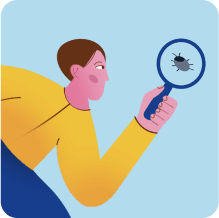Put things in writing
It is inevitable that some details slip out, which is why communication in QA should happen in writing. Luckily, testing is already predisposed to that due to the detailed bug reports that you had to make before being promoted to a test manager. Some people just process information better by reading rather than listening, and there could be a language barrier at international teams, too.
There is also a case for a middle ground: you can back up verbal communication with written notes. A good example of that would be sprint retrospectives. The format screams for an in-person or Zoom meeting so everyone can share their opinions. It won’t, however, be as effective without conclusions that can be referenced later. Good meeting notes are an essential practice for communicating as QA manager.
Implement a collaboration-minded test management solution
These days, most QA teams have thankfully moved on from Excel files that hindered even the near-perfect communication skills of test managers. The approaches of the past would mean disjointed task discussions, as your testers would have to scroll up some Skype messages to dig up details. It would be even worse when talking with developers who have their own operations going on.
Most test management solutions facilitate collaboration by default, as they provide increased visibility. Everyone (authorised) can see the status of relevant tests and issues. Some tools go much further to keep communication visible and well-connected. They let you leave comments under items and make it easy to follow up on them.
Test management solution with comments, nudging, automated workflows, and in-app translation
A collaborative tool will also go a long way when you prepare the QA team for test automation. It will always take some communication to sync manual and automated testing. Using the right tool will save you a lot of time and frustration from both setting up and handling these two types of testing.
Avoid direct messaging when relevant
People on QA teams are often interchangeable in what they do and could be doing instead. Unless you’re discussing a highly specific or work discipline matter, the right way to communicate effectively as a QA manager is to do it publicly. This will be a natural invitation for your senior colleagues to chip in, but also a point of reference for less experienced testers.
One neat solution could be a public chat with everyone on the team that is muted by default. People can mention colleagues for them to get notifications while others continue through their tasks undisturbed. Trust us, curiosity will take over: even people that weren’t mentioned in the chat for a couple of days will open it. Even if there is no input or learning opportunity at the time, knowing what is on your colleagues’ minds helps the process.
While not directly affecting the work itself, direct messaging has a negative impact on the team aspect of work. It has been hard enough to feel you are truly one team with forced and voluntary shifts to remote or hybrid work. Don’t make it worse by excluding colleagues where you shouldn’t.
Let your team know where they stand
It’s not just task-centred communication that a task manager has to be good at. As a person responsible for the QA success of the project, you’re also responsible for helping people know if they are on track. This is not a short-term goal either: proper development of QA specialists is in the best interest of your department (and the company).
Before giving testers any feedback, it’s important to see what is going on. Dashboards are a good place to apply QA manager’s skills and get some insights. You can use dashboards to track progress across several sprints, e.g. observe ratio of defects found during testing vs found after release. Dashboards can be useful to see if the QA effort is on time for an upcoming release, too. Select few tools (including aqua) even offer KPI Alerts that let you know if your team still has too many Critical issues to handle.
On a day-to-day basis, the regular Scrum ceremonies help everyone to see if they are keeping up. Daily standups are where your team shares their progress and brings up issues. Retrospectives aggregate improvement ideas on both individual and team level to make everyone’s work better.
On a more personal level, it’s primarily two things that you need to deliver. The first one is giving everyone a personal development plan. Completing actionable goals from them would benefit both the company and the employee. The second important thing is giving personal feedback where relevant. Senior testers will usually be the ones providing feedback on regular tasks, but it’s great when you can approach the QA manager for wider topics.
Conclusion
As a QA manager, you have a number of ways to communicate effectively both within and outside the QA team. It becomes even more important when you adopt and maintain automated software testing flow that puts extra teamwork burden on both the QA and development team. You can ease that by good communication.
Amplify excellent QA communication with a powerful testing tool






